Creating DIY herbal tea blends for better digestion is easy and rewarding. Start with key herbs like ginger, which eases nausea, and fennel, known for relieving gas. Try a blend of dried peppermint and chamomile for a soothing effect, or mix ginger and turmeric for their anti-inflammatory benefits. You can also brew dandelion root tea, which supports liver health and reduces bloating. Don't forget to enhance flavors with honey or lemon if you like. With a bit of experimentation, you can craft your perfect blend and discover even more beneficial recipes ahead.
Understanding Digestive Health

Digestive health plays an important role in your overall well-being, affecting everything from energy levels to immune function. When your digestive system functions at its best, it efficiently breaks down food, absorbs nutrients, and eliminates waste. This process is essential for maintaining your energy and liveliness.
If your digestion is off, you might experience bloating, gas, or irregularity, which can lead to discomfort and fatigue.
Understanding how your digestive system works helps you make better choices for your health. The gut is home to trillions of bacteria that aid digestion and support your immune system. You need to nourish these beneficial bacteria with a balanced diet rich in fiber, whole grains, fruits, and vegetables.
Staying hydrated also supports digestion, as water helps break down food and move it through your intestines.
Paying attention to your body's signals is crucial. If certain foods make you feel unwell, it's worth exploring your options.
By prioritizing your digestive health, you'll set the stage for improved overall wellness, paving the way for better nutrient absorption and increased energy levels.
Benefits of Herbal Tea
Herbal tea offers a delightful way to boost your health while enjoying a soothing ritual. You'll find that sipping on herbal tea can provide numerous benefits for your overall well-being. For starters, it's a great way to stay hydrated, and hydration is essential for ideal bodily functions.
Moreover, many herbal teas are packed with antioxidants, which help combat free radicals in your body, reducing oxidative stress and supporting your immune system. You might also appreciate that herbal tea can be caffeine-free, making it a perfect choice for evenings or when you want to relax without the jitters.
Another significant benefit is the potential for improved mental clarity and focus. Certain herbal blends can enhance your mood and promote relaxation, making them excellent companions for stressful days.
Additionally, these teas can be a comforting ritual, giving you a moment of peace in your busy life. By incorporating herbal tea into your daily routine, you'll not only enjoy its rich flavors but also embrace a healthier lifestyle.
Key Herbs for Digestion
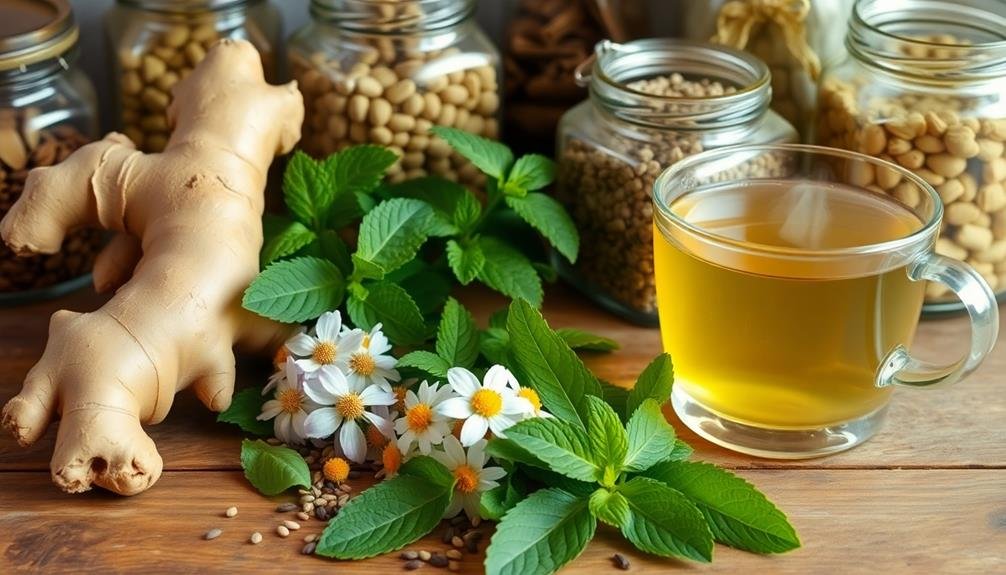
Several key herbs can greatly enhance your digestion, making them essential additions to your herbal tea blends. By incorporating these herbs, you can support your digestive system and enjoy soothing benefits.
Here's a quick overview of some of these powerful herbs:
| Herb | Benefits |
|---|---|
| Ginger | Eases nausea and reduces bloating |
| Fennel | Relieves gas and promotes digestion |
| Chamomile | Calms the stomach and reduces inflammation |
| Dandelion | Stimulates appetite and liver function |
| Licorice root | Soothes gastrointestinal issues |
When you choose to blend these herbs into your tea, you'll not only enjoy their unique flavors but also their digestive benefits. For instance, ginger can add a spicy kick while helping to soothe your stomach. Fennel seeds contribute a hint of sweetness and work wonders for gas relief.
Incorporating these herbs into your daily routine can help you maintain a healthy digestive system. So, experiment with these blends, and you might find the perfect combination that works for you!
Peppermint Tea Blend
Peppermint tea is an invigorating choice that not only delights your taste buds but also offers soothing benefits for your stomach. This delightful herbal blend can help relieve gas, bloating, and indigestion, making it a fantastic addition to your digestive health routine.
To create your own peppermint tea blend, start with dried peppermint leaves, which you can find at health food stores or online. For a revitalizing touch, combine peppermint with other herbs like chamomile or fennel. Simply mix one part dried peppermint leaves with half a part of your chosen herb for a well-rounded flavor.
When you're ready to brew, add one tablespoon of your blend to a cup of boiling water. Let it steep for about 5-10 minutes, allowing the flavors to meld while releasing the beneficial compounds. If you prefer a sweeter taste, a dash of honey or a slice of lemon can enhance the experience.
Sip your peppermint tea after meals or whenever you need a calming moment. You'll not only enjoy its revitalizing taste but also appreciate the relief it brings to your digestive system.
Ginger and Turmeric Infusion
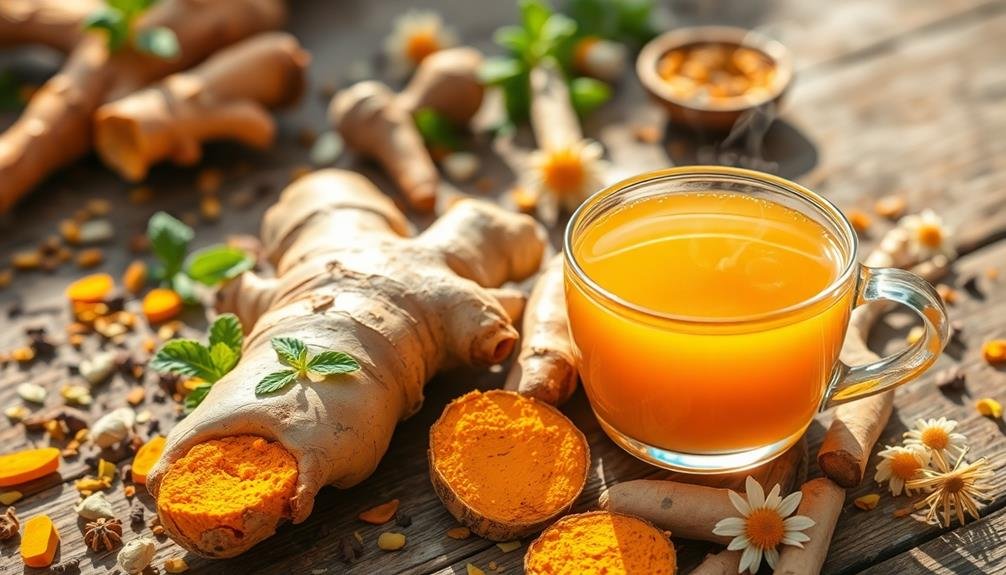
Ginger and turmeric are powerhouses when it comes to health benefits, offering everything from anti-inflammatory properties to digestive support.
You'll find that preparing an infusion with these two ingredients is simple and rewarding.
Let's explore how you can easily make this nourishing drink and the benefits it brings to your wellness routine.
Health Benefits Overview
When you think of natural remedies, ginger and turmeric often come to mind for their impressive health benefits. These two powerful ingredients are renowned for their ability to support digestion and overall wellness.
Ginger's active compound, gingerol, not only helps alleviate nausea but also promotes healthy digestion by easing bloating and gas. You'll find that sipping on ginger tea can provide quick relief after a heavy meal.
Turmeric, on the other hand, contains curcumin, a potent anti-inflammatory agent. This compound can help reduce inflammation in your digestive tract, making it especially beneficial for those with digestive disorders. By incorporating turmeric into your diet, you may experience improved gut health and enhanced digestion.
Together, ginger and turmeric create a synergistic effect that can help maintain a balanced digestive system. You'll also appreciate their antioxidant properties, which combat oxidative stress in the body.
Regularly enjoying a ginger and turmeric infusion can't only soothe your stomach but also boost your immune system and support overall liveliness. So, if you're looking to improve your digestion naturally, reaching for this herbal blend could be a fantastic choice.
Preparation Method Steps
To prepare a soothing ginger and turmeric infusion, you'll want to start by gathering your ingredients. Get a piece of fresh ginger root, about one to two inches, and a similar amount of fresh turmeric root. If you can't find fresh turmeric, turmeric powder works too. You'll also need four cups of water, a lemon, and honey or another sweetener to taste.
Begin by peeling and slicing the ginger and turmeric roots. If you're using turmeric powder, measure about one to two teaspoons instead.
In a medium saucepan, bring the four cups of water to a boil. Once boiling, add the ginger and turmeric. Reduce the heat and let it simmer for about 10 to 15 minutes. This allows the flavors and beneficial compounds to infuse into the water.
After simmering, remove the saucepan from heat and strain the liquid into your favorite teacup. Squeeze in some fresh lemon juice for added flavor and health benefits, and sweeten with honey if desired.
Enjoy your warm ginger and turmeric infusion, and feel the soothing effects on your digestion!
Chamomile and Fennel Mix
Chamomile and fennel make a soothing tea blend that not only calms your mind but also aids digestion.
You'll appreciate the calming benefits of chamomile, while fennel's digestive properties can help settle your stomach.
Let's explore how to brew this delightful mix to maximize its benefits.
Benefits of Chamomile
While many people seek natural remedies for relaxation and digestion, the combination of chamomile and fennel offers a powerful duo that's hard to ignore.
Chamomile, renowned for its calming properties, helps soothe both your mind and stomach. When you sip on chamomile tea, you're not just treating yourself to a warm beverage; you're also easing tension and reducing anxiety, making it easier for your body to digest food.
Moreover, chamomile contains antioxidants that can support your overall health. It's known to promote a good night's sleep, which is essential for proper digestion. When you're well-rested, your body functions more efficiently, including your digestive system.
Additionally, chamomile has anti-inflammatory properties that can help reduce bloating and discomfort after meals. If you suffer from occasional digestive issues, incorporating chamomile into your routine can provide relief and comfort.
Combining chamomile with fennel can enhance these effects, creating a tea blend that not only tastes delightful but also supports your digestive health.
Fennel's Digestive Properties
Fennel's digestive properties make it a valuable addition to any herbal tea blend, especially when combined with chamomile. This powerful duo not only soothes your stomach but also promotes overall digestive health. Fennel seeds contain compounds that can help reduce bloating and gas, making your tea experience even more enjoyable. When you sip on this blend, you're giving your body a natural remedy for discomfort.
Here's a quick look at the benefits of each ingredient:
| Ingredients | Benefits |
|---|---|
| Fennel | Reduces bloating, aids digestion |
| Chamomile | Calms stomach, promotes relaxation |
| Combined | Enhances digestive comfort, soothes anxiety |
| Overall | Supports gut health, improves well-being |
Brewing Techniques Explained
When you're ready to brew your chamomile and fennel tea mix, it's vital to follow the right techniques to extract the maximum benefits from both herbs.
Start by gathering your ingredients: one tablespoon of dried chamomile flowers and one tablespoon of crushed fennel seeds. Confirm you have fresh, filtered water for the best flavor.
Boil about four cups of water in a kettle. Once it reaches a rolling boil, remove it from heat and let it cool for about 30 seconds. This slight cooling is essential since boiling water can scorch delicate chamomile, affecting its flavor and benefits.
Add your chamomile and fennel to a teapot or infuser. Pour the hot water over the herbs, allowing them to steep for about 5–7 minutes. This time frame lets the flavors meld while infusing the health benefits into your tea.
After steeping, strain the tea into your favorite cup. You can enjoy it plain or sweeten it with honey if you like.
Sip slowly, and let the soothing properties of chamomile and fennel work their magic on your digestion!
Lemon Balm and Licorice
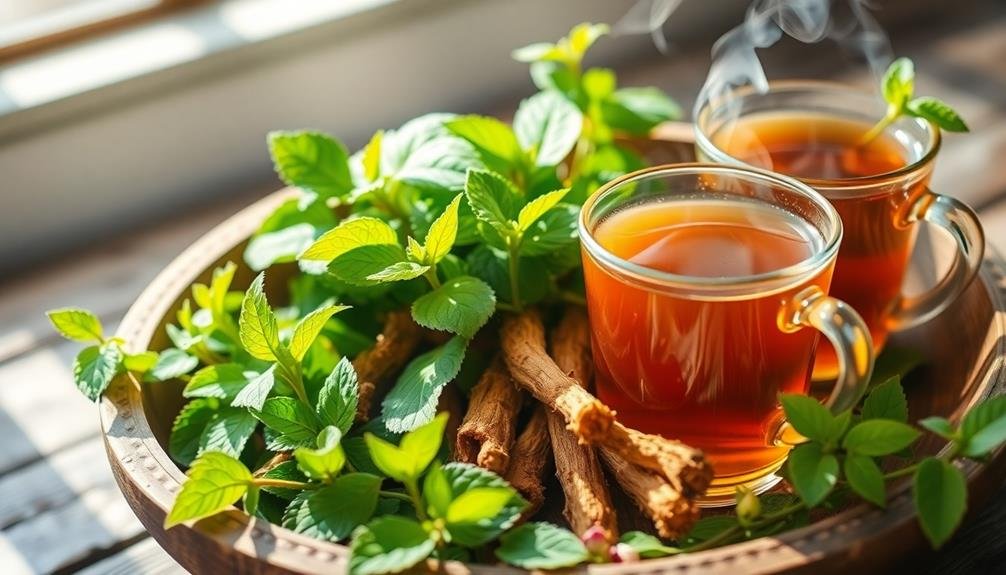
Combining lemon balm and licorice creates a soothing herbal tea that's both invigorating and beneficial.
Lemon balm, with its fresh, lemony flavor, helps calm your digestive system and reduce bloating. It's known for its mild sedative properties, which can ease stress and tension—factors that often contribute to digestive issues.
Licorice root adds a naturally sweet taste and has its own digestive benefits. It may help with stomach discomfort and is recognized for its anti-inflammatory properties.
When you blend these two herbs, you not only enjoy a delightful taste but also support your gut health.
To prepare this tea, use one tablespoon of dried lemon balm and one teaspoon of dried licorice root. Steep the mixture in boiling water for about 10 minutes. You can adjust the quantities based on your taste preferences.
For an extra twist, consider adding a slice of fresh ginger or a dash of honey. This blend can be enjoyed warm or iced, making it a versatile choice for any time of day.
Sip on this herbal infusion regularly to promote better digestion and overall wellness.
Cinnamon and Clove Combination
A delightful blend of cinnamon and clove creates a warming herbal tea that's perfect for cozy evenings. Both spices offer unique flavors and digestive benefits, making this combination a great choice for soothing your stomach.
Cinnamon is known for its ability to help regulate blood sugar and can ease bloating, while clove has natural antiseptic properties that can aid in digestion.
To prepare your tea, start by boiling water and adding one teaspoon of ground cinnamon and half a teaspoon of ground clove. You can also use whole spices; just remember to crush them slightly to release their flavors.
Let the mixture steep for about 10 minutes to fully extract the beneficial properties. Strain the tea into your favorite mug, and if you like, add a touch of honey for sweetness.
Enjoy this warm drink after meals to promote healthy digestion and comfort. The rich aroma and spicy notes won't only lift your spirits but also help you unwind.
Dandelion Root Brew

If you're curious about Dandelion Root Brew, you'll find it packed with health benefits that can boost your wellness routine.
You can easily brew it at home using a few simple methods, and there are plenty of ways to enhance its flavor to suit your taste.
Let's explore how to make this delightful herbal tea and elevate your sipping experience.
Health Benefits Overview
Dandelion root brew frequently surprises those who explore its health benefits.
If you're looking for a natural way to support your digestive system, this herbal tea might be just what you need. Packed with nutrients and compounds, dandelion root has several advantages that can aid digestion and overall health.
Here are four key benefits you can enjoy from dandelion root brew:
- Stimulates Digestion: Dandelion root can promote the production of digestive enzymes, helping your body break down food more efficiently.
- Supports Liver Health: It's known to help detoxify the liver, which plays an essential role in digestion by processing nutrients and filtering toxins.
- Reduces Bloating: The natural diuretic properties of dandelion root can help alleviate bloating and water retention, making you feel lighter.
- Rich in Antioxidants: Dandelion root is loaded with antioxidants that combat oxidative stress, supporting your gut health and immune system.
Brewing Methods Explained
When you're ready to brew dandelion root tea, knowing the right method can make all the difference in flavor and health benefits. Start by selecting dried dandelion root, which you can find at health food stores or online. For a standard brew, measure about one tablespoon of the dried root for every cup of water.
Begin by bringing your water to a rolling boil. Once it's ready, add the dandelion root to the water, then reduce the heat to let it simmer. Cover the pot and let it steep for about 20 to 30 minutes. This longer steeping time helps extract the beneficial compounds from the root, enhancing its digestive properties.
After steeping, strain the tea into a cup, discarding the solids. You can enjoy your dandelion root tea warm or chilled, depending on your preference.
If you find the flavor too strong, adjust the amount of root or steeping time in your next batch. Remember, patience is key with herbal teas, as the longer you steep, the more robust the flavor and benefits.
Enjoy your brew as part of your daily wellness routine!
Flavor Enhancements Options
Enhancing the flavor of your dandelion root tea can elevate your brewing experience and make it even more enjoyable.
By experimenting with different ingredients, you can create a blend that suits your taste perfectly. Here are some flavor enhancement options to contemplate:
- Cinnamon: Adding a stick of cinnamon or a sprinkle of ground cinnamon can introduce a warm, sweet spice that complements the earthy notes of dandelion root.
- Ginger: Fresh ginger slices or a dash of powdered ginger provide a zesty kick and can aid digestion, making your tea not only tasty but also beneficial.
- Lemon: A squeeze of fresh lemon juice brightens the flavor and adds a revitalizing citrus note. The acidity balances the bitterness of the dandelion root beautifully.
- Honey: Sweetening your tea with honey can enhance the overall taste. It adds a touch of natural sweetness that harmonizes well with the herbal flavors.
Green Tea and Mint
Nothing rejuvenates quite like a cup of green tea infused with mint. This delightful combination not only offers a burst of flavor but also packs a punch when it comes to digestion.
Green tea is renowned for its antioxidant properties, aiding in overall gut health. When you add mint, you enhance the tea's soothing qualities, making it easier for your body to process food.
Drinking this blend can help alleviate bloating and discomfort after meals. The menthol in mint acts as a natural relaxant, calming your stomach muscles and promoting smoother digestion.
Plus, the invigorating aroma of mint can uplift your spirits and invigorate your senses, making this tea an ideal choice at any time of day.
To enjoy the benefits of this blend, simply steep loose green tea leaves with fresh mint leaves. You can adjust the ratio to suit your taste, whether you prefer a stronger mint flavor or a more subdued one.
Enjoy it hot or iced—either way, you'll be treating yourself to a delicious, digestive-friendly beverage that you can easily incorporate into your daily routine.
Creating Your Own Blend

Creating your own herbal tea blend can be an exciting and rewarding experience. You get to customize flavors and health benefits while exploring your creativity.
Here's how to craft your perfect blend in just a few simple steps:
- Choose Your Base: Start with a primary herb or tea that suits your taste. Consider options like ginger for warmth or chamomile for a calming effect.
- Add Complementary Herbs: Select two to three additional herbs that enhance your base. For digestion, peppermint and fennel work well together.
- Select Flavor Enhancers: Think about adding spices or citrus peels for extra flavor. Cinnamon or lemon zest can brighten your blend and add a delightful twist.
- Experiment and Adjust: Mix your herbs in small batches, tasting as you go. Don't hesitate to tweak the ratios until you find your ideal balance.
Once you've created your blend, jot down the recipe for future reference.
Enjoy the process of experimentation, and remember, there are no wrong combinations—just unique flavors waiting to be discovered!
Tips for Brewing Herbal Tea
When it comes to brewing herbal tea, the right technique can make all the difference in flavor and aroma. Start by using fresh, high-quality herbs. Whether you're using loose leaf or tea bags, make certain they're stored in a cool, dark place to maintain their potency.
Next, pay attention to water temperature. Most herbal teas benefit from boiling water, ideally between 200°F to 212°F (93°C to 100°C). This helps extract the full flavor from the herbs.
Steep your tea for the right amount of time—generally, 5 to 10 minutes. Experiment with steeping times to find what suits your taste.
Don't forget about the water! Using filtered or spring water can enhance the overall taste, as tap water may contain impurities that affect the flavor.
Frequently Asked Questions
How Can I Tell if a Tea Blend Is Effective for Me?
To determine if a tea blend's effective for you, pay attention to how your body reacts after drinking it. Notice any changes in energy, mood, or digestion, and adjust your choices accordingly for best results.
Are There Any Side Effects of Drinking Herbal Teas?
Yes, there can be side effects from drinking herbal teas. You might experience allergies, digestive issues, or interactions with medications. Always pay attention to how your body reacts and consult a healthcare professional if unsure.
Can I Use Fresh Herbs Instead of Dried Ones?
Absolutely, you can use fresh herbs instead of dried ones! Just remember that fresh herbs are more potent, so you'll need to adjust the quantity to achieve the flavor and benefits you're aiming for. Enjoy experimenting!
How Often Should I Drink Herbal Tea for Digestion?
You should drink herbal tea for digestion daily, preferably after meals. It helps soothe your stomach and promotes better digestion. Listen to your body; adjust the frequency based on how you feel and your needs.
Are There Specific Times of Day to Drink Digestion Teas?
You can drink digestion teas after meals to support your digestive process. Morning and evening are great times too, as they can help soothe your stomach and promote overall digestive health throughout the day.
In Summary
By incorporating these herbal tea blends into your routine, you can support your digestive health naturally. Whether you enjoy the invigorating taste of peppermint or the warming qualities of ginger and turmeric, there's a blend for everyone. Experiment with your own combinations to discover what works best for you. Remember, brewing herbal tea is not just about health; it's also a delightful ritual. So, sip your way to better digestion and enjoy the journey!

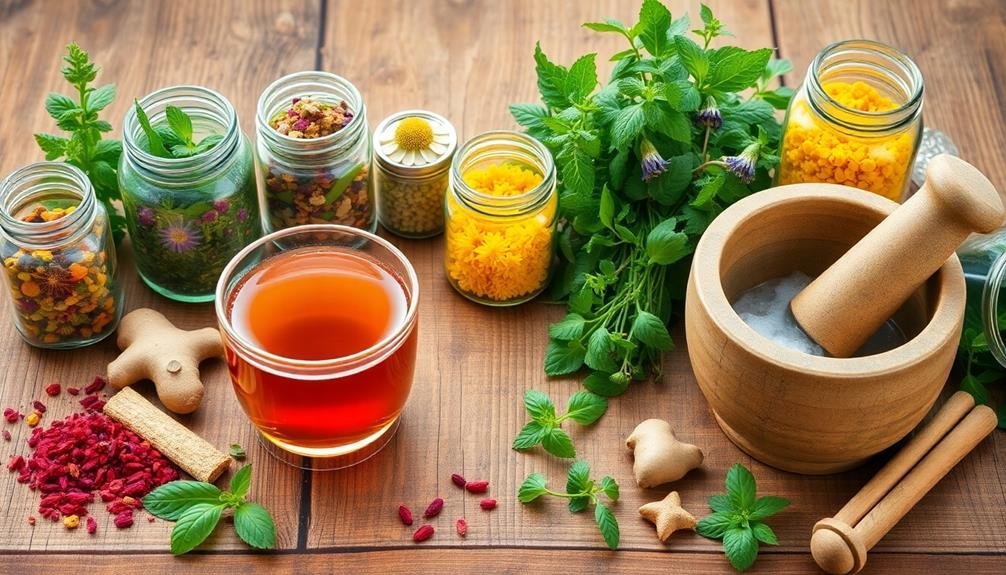

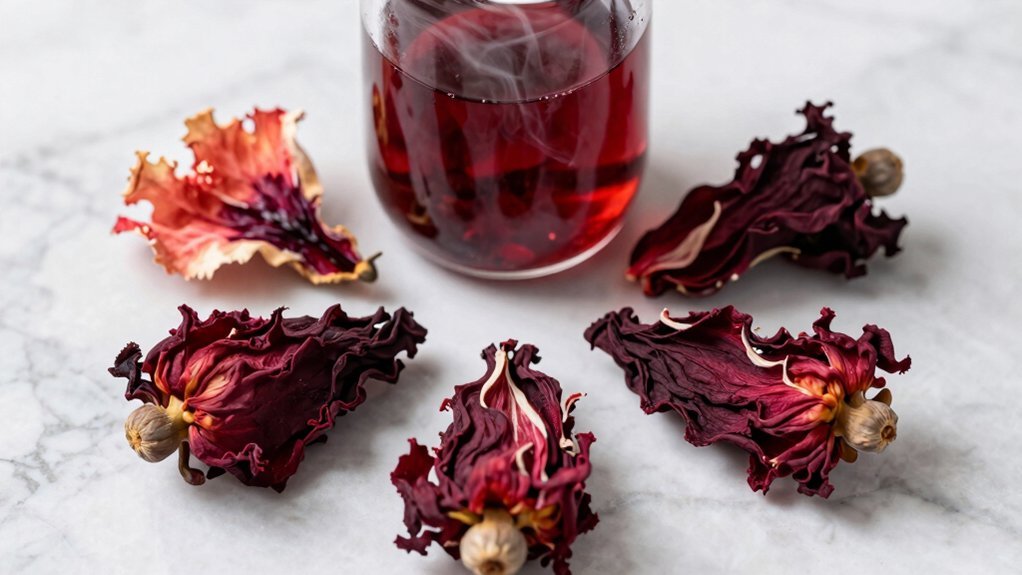

Leave a Reply